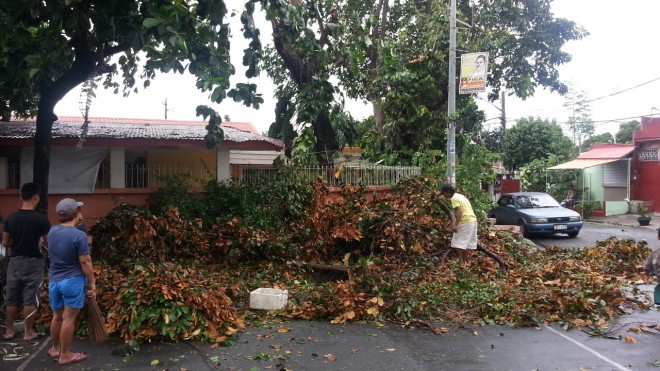MANILA, Philippines – In the wake of Typhoon Glenda’s strong winds that battered Luzon, the Philippine National Police (PNP) issued safety tips to the public to avoid loss of life and minimize damage to properties.

Residents of Quezon City clean up fallen branches and leaves that were caused by Typhoon Glenda’s strong winds. MATIKAS SANTOS/INQUIRER.net
“The PNP Chief Director General Alan Purisima activated the PNP National Headquarters Disaster Incident Management Task Group to coordinate all disaster response operations of the police in areas that has been affected and threatened by Glenda,” PNP said in a statement Wednesday.
“Disaster response teams with equipment and supplies have been prepositioned to disaster-prone-areas especially along the eastern seaboard of Luzon and Visayas,” it said.
The PNP gave 14 safety tips during and after a typhoon for the public.
During a typhoon:
1. Do not panic, remain calm.
2. Pack foods that don’t need cooking.
3. Keep flashlights, candles and battery-powered radios within reach.
4. Examine your houses and repair unstable parts as much as possible.
5. Secure domesticated animals in a safe place.
6. Bring clothes, first-aid kit, candles/flashlights, battery-operated radios, food, etc. during evacuation.
7. Stay inside the house and keep updates with the latest weather forecast.
8. If safe drinking water is NOT available, boil water for at least 20 minutes, then place it in a container with cover.
9. Keep an eye on lighted gas lamps.
10. Do not wade through flood waters to avoid electrocution and water-borne diseases.
11. Stay away from low-lying beaches or other locations which may be swept away by tides or waves.
12. Check everything that may be blown away or turn loose. Flying objects are dangerous during typhoons.
13. Do not use gas or electrical appliances that were submerged during flood.
14. Be calm when going to an evacuation center. Close all windows and turn off main power switch before leaving home. Put important appliances and belongings on a high ground. Avoid roads leading to the river and areas prone to land-slide.
After typhoon:
1. Be sure that the house/ building is safe and stable before you enter.
2. Beware of poisonous animals like snakes that may have entered your house.
3. Watch out for live wires or outlet immersed in water and report damaged electrical cables and fallen electric posts to authorities.
RELATED STORIES
‘Glenda’ batters Subic; Metro Manila still under Signal No. 3